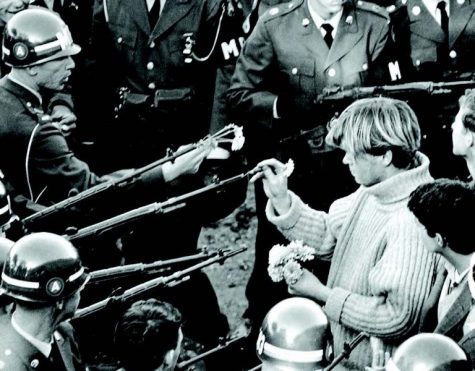boygenius is 100% girl genius
A review of the new boygenius album and short film
May 1, 2023
Boygenius; the American indie rock supergroup made up of Julien Baker, Lucy Dacus, and Phoebe Bridgers, formed their band as a rejection of the music industry’s attitude towards women, and the competitive nature among women, specifically in rock, citing inspiration from Wild Flag and the Highwomen. Both Dacus and Bridgers opened for Baker’s tour in 2016, which resulted in the formation of the band as well as the writing, recording, and self-production process of their EP; also titled boygenius. The EP was written, recorded, and produced in four days and exclusively involved women. It was released on October 26, 2018. For five years following their EP, the artists worked on their solo careers and took a hiatus from performing and recording as a group.
In January of 2023, the band announced their debut studio album, The Record would be released on March 31, 2023. With the announcement, all of the album artwork and three singles from the album $20, Emily I’m Sorry, and True Blue were released. The rest of the album was released on March 31 as planned through Interscope Records. It earned all three artists their first number one album by topping charts in Ireland and the U.K., as well as peaking at number four on the Billboard 200. The Record was received well from respected names such as New Musical Express (NME) and Rolling Stone.
The band will be going on two tours to support the album; the first of which will be the re:SET concert series followed by ‘The Tour’. Their first performance in Oregon will be in Bend, at the Hayden Homes amphitheater on Sunday, July 30, 2023. To purchase tickets, their tour dates with ticket links are available on their website.
The Singles
The three premier singles showcase boygenius’s strong connection, because each song was written outside of the group, the individuality of each member is strongly represented, offering listeners the opportunity to appreciate both the stylistic differences and the vocal blend they create as a band.
$20 highlights Julien Baker’s experiences with compulsive self-destructive tendencies, messy relationships, and burnout through her distinct indie-rock style that reflects her experience growing up gay in a religious southern evangelical household. As the song begins, Baker leads, while Dacus and Bridgers finish her sentences.
The lyrics “Pushing the flowers as they come up/ In front of a shotgun” is a reference to Bernie Boston’s 1967 photograph Flower Power, in which a Vietnam War protester places flowers into the guns pointed at him by the police force. The photo; originally printed for the now defunct newspaper The Washington Evening Star, was nominated for the 1967 Pulitzer Prize. Baker attempts to mimic that imagery of holding space for peace among chaos throughout the song. As Baker sings through her internal monologue in her usual soft-punk style, Dacus and Bridgers offer supplementing harmonies and the song ends with a soundscape of overlapping vocals before Bridgers delivers her signature scream, this time shrieking “Can you give me 20 dollars?”

Emily, I’m Sorry shifts the spotlight over to Phoebe Bridgers, sharing similar themes of broken dreams to $20. Using a name shared in songs from big names such as Frank Sinatra and Art Garfunkel, Bridgers begins with what seems to be a dreamy, nostalgic moment, however the storyline takes a dark turn as she plays out a car crash as a metaphor for being unable to leave a messy situation that also feels like the only relationship for her. Dacus and Baker join Bridgers on the chorus as the song becomes a regretful apology to a past partner and the feeling of simultaneously being supported by and trapped by love. The song is said to be inspired by Simon & Garfunkel’s For Emily, Wherever I May Find Her in which a man dreams of his ideal woman who is inevitably too good to be true, and he struggles to wake himself up from the scenario. Undeniably, similarities can be drawn between the structure of this song and $20 as it comes to a breaking point in the story where Bridgers is faced with the reality of her situation. The ballad, consisting of a past-due apology with hints of uncertainty, is tied together beautifully with Dacus and Bakers’ graceful backup harmonies.
True Blue is the final single, highlighting Lucy Dacus’s songwriting and musicality. Historically, Dacus’s songs are written as love letters to her past as well as the past of her former partners. In the first verse, the lyrics “You say you’re a winter b*tch/ but summer’s in your blood/ you can’t help but become the sun,” communicate the desire to keep this person stuck in a memory, however as tension from past interactions are uncovered, listeners understand why the earlier memory of her partner is viewed as more cynical. In the final verse, another glimpse into the tension is offered through the lyrics “You’ve never done me wrong, except for that one time/ that we don’t talk about/ because it doesn’t matter anymore/ who won the fight? I don’t know/ We’re not keeping score,” as Dacus wishes this person the best and misses who they were in the past. This sense of unconditional love shares themes with other Dacus-led tracks on The Record.
The Album
The record opens with an acapella performance of Without You Without Them. In another Dacus-led track, the energy of Ketchum, ID from their EP is continued — tying the projects together with a spirit of appreciation for loyal fans, while simultaneously transitioning into their new album. The notable lyric “Who would I be without you, without them?” acknowledges both elements of “you” addressing the fans, as well as “them” addressing the other members of the band. This ‘breaking of the fourth wall’ moment creates a unique connection with listeners that is maintained throughout the album.
The singles are placed after Without You Without Them in the order of $20 followed by Emily, I’m Sorry which is followed by True Blue. The decision to place them here as opposed to being separated from the album itself is unique. I personally agree with the placement of the singles here, as we’ve been introduced to the album, and now are offered a sample of each artist’s personal style.
The inspiration for Cool About It is credited to Simon and Garfunkel’s 1970 hit The Boxer. Apart from the liner notes, Simon is not listed as a songwriter nor is he mentioned in the song itself. The song explores the post-breakup phase of anxiety and relearning how to interact with a past partner in a friendly manner. The lyrics “wishing you were kind enough to be cruel about it” encapsulates the feeling that any interaction with an ex-partner can be insufficient and validates the feelings of confusion and hurt that occur upon leaving a relationship.
Not Strong Enough follows a country-pop style of music while paying homage to Sheryl Crow’s Strong Enough with their witty reply in the form of this song. Not Strong Enough explores the idea of duality within the lyrics “Half a mind that keeps the other guessing” alongside its epic Dacus-led bridge with the words “Always an angel/never a God.” This song has been called the “most communal” on the album by the group, which means we get the best of all three worlds of musicality. The idea of duality presented through the minds of boygenius, about not being able to be enough for someone else while simultaneously being too much. This contrast shows up again when the same idea is presented through an individual mentality, where the confidence is there at the same time as the belief that there is something wrong with you. This relatable feeling is played out as Baker takes the second verse, driving through LA blasting music, but not being able to shake the feeling that something terrible is about to happen. Dacus leads the last chorus with newfound acceptance as the song comes to a close.
Revolution 0 is said to be an homage to Elliot Smith, whom band member Phoebe Bridgers admires as a fellow singer-songwriter. The original title of the song was going to be “Paul is Dead” as a reference to the controversial situation surrounding the death of The Beatles’ member Paul McCartney. Aside from The Beatles References, the track also mentions the relationship between the actor Paul Mescal and Bridgers, which ended in late 2022. Bridgers told Rolling Stone that Revolution 0 is about “falling in love online.” The track contains feelings of self-doubt, heartache, and loneliness through boygenius’s thoughtful lyricism and imagery.
Named after the famous Canadian singer/songwriter whose song, Anthem, is featured on the track, Leonard Cohen is significantly shorter and doesn’t reach the standard for lyricism that other songs on the album do. However, the imagery of the band distractedly driving in the wrong direction is a sweet one. The consistency of the album’s supposed theme of friendship is audible throughout the song, and while its role in the album is a small one, the dig in Dacus’s lyric “And I am not an old man having an existential crisis/At a Buddhist monastery/Writing horny poetry,” takes at the late singer songwriter is humorous if nothing else.
Satanist takes a creative twist on the friendship theme. Each band member wrote their verses surrounding a personal belief system, and throughout the song we see them ask someone to be an anarchist/nihilist/satanist with them. Each verse is unique to the writer, but the sentiment remains the same, noting the band members’ desires for someone to stay with them through the “seismic shifts” they undergo. Despite the religious aspect to the idea of satanism, the lyrics “mortgaging off your soul to buy your dream” suggest a greater criticism of capitalism. Bridgers references King Solomon’s book of Ecclesiastes, which is said to be the most philosophical part of the Bible, in the second verse as she relates it to nihilism. Boygenius’s interpretation of King Solomon’s book is undeniably confusing, stating “if nothing can be known then stupidity is holy.” This song seems to be a staple in the album, not only for its creative lyricism and thoughtful references, but also for the personality it attributes to each band member.
We’re In Love was written and performed by Dacus as a love letter to her bandmates. The lyrics “I could go on and on and I will,” have been credited to Taylor Swift from her Lover era hit, This Love. As the theme of friendship continues, a subtle nod is given to the queer identities of all three singer-songwriters. While their connections to each other are only known to be platonic, they’ve all openly discussed the difficulties they’ve experienced as queer women in the music industry throughout their careers. This sweet ballad explores the meaning of love in compelling lyrics only Lucy Dacus could think of. “If you rewrite your life, may I still play a part?” poses such a simple yet authentic way of viewing meaningful friendships and appreciation of the people we love.
Anti-Curse is an ode to Julien Baker’s struggle with mortality after her near death experience at a public beach. The song includes sensory details as well as her attempts to eulogize herself, reflecting on her friendships and childhood. The symbolic crescendo as Baker sings about “swimming back” as she has realized that the connections she has and the art she makes is reason enough to continue living. Baker’s relatable lyrics encapsulate the feeling of hoping we did enough, and the anxiety we feel around death and mortality as humans. This track is interesting because its meaningful messaging doesn’t match the catchy beat and melody, and the unique perspective it offers on Baker’s mentality and vulnerability definitely holds a purpose within this album.
Letter to An Old Poet is the perfect closer to the record. The idea for the song came from a group therapy session. The title references Rainer Maria Rilke’s Letters to a Young Poet,‘ which is a collection of correspondences between Rilke and Franz Xaver Kappus. Throughout the ten letters, Rilke teaches Kappus to write and appreciate poetry, and reflects on his own experience as a young writer. Bridgers reflects on her past in contrast to the inspiration for the track, recognizing a past toxic relationship. Her lyricism is highlighted in this song, and the symbolism of her gained strength as the lyrics “I wanna be happy/I’m ready to walk into my room without looking for you,” emphasize her growth from the lyrics in Me and My Dog from their EP which tell a story of Bridgers in a completely different mentality singing “I wanna be emaciated/I wanna hear one song without thinking of you.” Not only is this shift a triumph for Bridgers, but longtime boygenius fans find this to be a rewarding and emotional moment for them as well.
Alongside the global debut of the record, boygenius also released the film, a 14 minute short film highlighting the three singles. Directed by Kristen Stewart, the film portrays the experience of growing, apologizing, and moving forward. The band members begin the film as younger versions of themselves and we watch them move through their lives to their current selves. With the amount of talent and creativity that went into creating the record, it’s no surprise that the film holds a similar nostalgic feeling and communicates the importance of strong friendship in our lives. The film is a wonderful partner to their debut album, and as boygenius continues to gain popularity, there is hope for more projects like these in the near future.
The record is a beautiful and complex exploration of human emotion throughout adolescence and adulthood. While this is a big topic to write about, boygenius does so with tact and grace. Aside from the meaningful messaging, we are offered moments to appreciate the group dynamic as well as moments to appreciate the artists’ solo musicality. That variation is impressive given that this is their debut studio album. Baker, Bridgers, and Dacus are truly a dream team of songwriting, production, and performance. The record is a standout debut and an exciting window into what’s next for boygenius.
As Phoebe Bridgers once said “It matters to me” that you experience the girl genius that is boygenius’s The Record.



